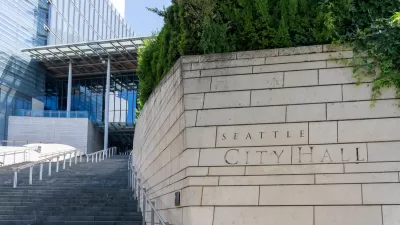The subdivision process imposes rules that result in a lack flexibility, convoluted urban design, and diced up landscapes.

Ray Dubicki argues subdivision and the parceling of land should get as much attention as zoning when examining how cities are shaped. "Once a lot is created through subdivision, it never gets unmade. Subdivision leaves a paper trail burdened with the weight of the past and creating a significant barrier to change. That barrier gets higher and higher as we shred city land into the tiniest possible atoms."
Dubicki says the decisions related to subdivision can create less-than-ideal results that are permanent. "There is a reason that the building industry refers to the results of subdivision approvals as 'entitlements.' They are court enforceable rulings on the intensity of development and limits to what the city is asking for. Builders plug this into their accounting to figure out profit and loss. The jurisdiction’s hands are then tied."
Subdivision also hinders denser developments by creating smaller and smaller parcels that are then more difficult to consolidate for larger multi-family buildings. In addition, parcels such as "flag lots," requiring long, shared driveways for access to a public road, create "puzzle piece subdivisions," says Dubicki.
"Perhaps our challenge is to move our subdivision mindset away from the simple parceling out of land and entitlements. The flat, indelible lines of subdivision are just as inflexible as the old flat LEGO baseplates. We are developing newer ways of thinking about layers of space in our cities, including different methods of ownership and the ways they impact our communities," adds Dubicki.
Update: At the end of his article on subdivision, Dubicki asked readers to nominate the strangest lot lines in the Seattle areas. He has compiled the most bizarre lot winners, including the Olympic Hammerhead, Sammamish Crop Circles, and the Land Meander.
FULL STORY: The Lines We Draw: Subdivision

Planetizen Federal Action Tracker
A weekly monitor of how Trump’s orders and actions are impacting planners and planning in America.

Congressman Proposes Bill to Rename DC Metro “Trump Train”
The Make Autorail Great Again Act would withhold federal funding to the system until the Washington Metropolitan Area Transit Authority (WMATA), rebrands as the Washington Metropolitan Authority for Greater Access (WMAGA).

The Simple Legislative Tool Transforming Vacant Downtowns
In California, Michigan and Georgia, an easy win is bringing dollars — and delight — back to city centers.

The States Losing Rural Delivery Rooms at an Alarming Pace
In some states, as few as 9% of rural hospitals still deliver babies. As a result, rising pre-term births, no adequate pre-term care and "harrowing" close calls are a growing reality.

The Small South Asian Republic Going all in on EVs
Thanks to one simple policy change less than five years ago, 65% of new cars in this Himalayan country are now electric.

DC Backpedals on Bike Lane Protection, Swaps Barriers for Paint
Citing aesthetic concerns, the city is removing the concrete barriers and flexposts that once separated Arizona Avenue cyclists from motor vehicles.
Urban Design for Planners 1: Software Tools
This six-course series explores essential urban design concepts using open source software and equips planners with the tools they need to participate fully in the urban design process.
Planning for Universal Design
Learn the tools for implementing Universal Design in planning regulations.
Smith Gee Studio
City of Charlotte
City of Camden Redevelopment Agency
City of Astoria
Transportation Research & Education Center (TREC) at Portland State University
US High Speed Rail Association
City of Camden Redevelopment Agency
Municipality of Princeton (NJ)





























